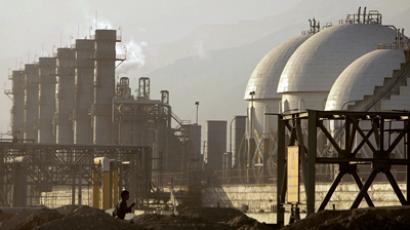Turkey pumps up oil imports from Iran: ‘Big hole’ in Western sanctions?
Turkey has sharply increased oil imports from Iran, risking anger from Western powers desperate to isolate Iran from the international market. Turkey imported over a million tons of Iranian crude this March - the highest purchase since last July.
Political analyst Chris Bambery told RT that the US has much less influence on Ankara these days, and Turkey is highly unlikely to join the US-EU Iranian oil embargo.RT: Trade between Iran and Turkey has increased sharply in recent months, peaking in March. How much of a problem are the US and EU sanctions on Iran for Ankara?Chris Bambery: They were putting pressure on Ankara to stop buying Iranian oil but the Americans and the Europeans have less sway over Ankara than they would have had over 20 years ago. Up until the end of the Cold War, Turkey was a very close ally of America in the front line of the Cold War with the former Soviet Union, generally putting their own needs behind American needs. Since those days we’ve seen two things happen. First is the end of the Cold War. We’ve also seen the European Union reject Turkey, I think on essentially racist grounds. And changes are also seen inside Turkey. The Turkish military are no longer the dominant force they were in Turkish politics. And the Turkish economy is expanding, becoming a real player in the region. And therefore Turkey has got its own interest in having a good relationship with Iran – another expanding country in that region. There are problem areas within Iran and Turkey over the question of Syria, over the question of Turkey’s site in the missile defense shield, which is aimed very much at Iran as well as at Russia, on its territory. But there are good reasons for the two countries to cooperate and we’ve seen growing economic ties between [them]. It is not just the question of oil – there’s been an increase in Turkish sales of jewels, gold and other precious metals to Iran, numerous exchanges between the two countries.So it’s not just simply a question not of London, or Washington, or Paris, or Berlin calling the shots in Turkey. They are operating in their own way in their own interests. The fact that we’ve seen this huge expansion of Iranian oil being bought by Turkey in March I think reflects that and shows they are not just going to jump to the hill of the backing call of the Americans or the European Union.RT: The US oil ban is due to come into full effect in July. Will Turkey be able to get by without Iranian oil?CB: Well, I could see Turkey actually saying “No, we’ll keep buying it.” Iran is supplying virtually a majority of their oil needs. If they were not buying Iranian oil they would be buying Iraqi oil. And that opens up another number of issues there over a number of questions. I don’t think Ankara will be that keen on depending on Iraq at the moment.Turkey is exerting its own influence in the region and it does not necessarily come into conflict with Iran. Turkey’s interest is in the Caucasus, in other parts of the world. It does not feel itself pitched against Iran. Certainly not in the way that Saudi Arabia and the Gulf states do, who in my view are desperate for someone to attack Iran, because they feel Iranian hegemony in the region, they feel Iranian influence in the region, and don’t like the Iranians and never have liked the Iranians.RT: Turkey is not the only country heavily dependent on Iranian oil – India is another country for whom it is crucial. How much of this is connected with US geopolitics in the region?CB: I think it is very much connected. What we are seeing is those rising economies. And since the days of the Cold War, a lessening of their alliance to the United States of America, we are seeing countries like India beginning to adopt their own unused earlier foreign policies reflecting their own new economic power.I don’t think India, which has very important links with Tehran, is just simply going to jump and impose sanctions, and it’s not done that. China is certainly not going to do that, Russia is not going to do that. And other countries like Indonesia, which is another expanding country, I don’t think will do that either.Therefore there is a big hole in the sanctions which the West is trying to impose on Tehran, and it looks to me as if they are not going to work in terms of what they are aimed at, which is certainly what the Americans and the British wanted to do, which is sanctions on Iranian oil to try and bankrupt the Iranian economy and undermine the Islamic Republic of Iran.I don’t think that is going to happen, and therefore there is a real problem for the West now imposing the sanctions.














